Tzu Chi Jakarta Volunteer: Hong Tjhin
Making Life Meaningful
In Tzu Chi, we first learn to be grateful with what we have,” Hong Tjhin unveils his life transformation through Tzu Chi.
It might not be easy to call his unique name for some Indonesian people. While visiting Tzu Chi's foster children in Pati, Central Java in April 2007, he started the habit. "What rat has two legs?" he asked the people gathered at the Eka Dharma Loka Vihara, Glagah Village. There were several people who try to answer it, but no right answer was given. Finally, he answered the question himself, "Mickey Mouse." Then, he asked again, "What about a duck with two legs?" This time, everyone answered in unison, “Donald Duck.” He immediately replied, "Wrong answer because all ducks have two legs." People smiled realizing their mistake.
“Mickey Mouse and Donald Duck,” he added, “the closest (Disneyland) from here is in Hong Kong. To remember my name, just remember “Hong” and change “Kong” into Tjhin, Hong Tjhin." That was how Hong Tjhin introduced himself. Born in Semarang on January 14, 1967 with full birth name Tjhin Hong Ling, he is now at the peak of busyness as Director of DAAI TV Indonesia. DAAI TV Indonesia is a television station owned by Tzu Chi which began broadcasting in Jakarta on channel 59 UHF in August – September 2007. Previous broadcast was on June 30, 2007 in Medan on channel 51 UHF. Despite his busy workload, he never loses his laughter, one of the most memorable characteristics of him.
Benchmark of Love
In 1998, Indonesia experienced a severe economic recession that led to mass riots in May. The riots made the situation even worse. The Sinarmas Group, where Hong Tjhin worked, commited to ease suffering of the people. They finally chose to join Tzu Chi who distributed 100 thousand food packages. Due to the limited number of Tzu Chi volunteers at that time, Sinarmas employees were encouraged to help. Hong Tjhin was one of them. "Sinarmas had its own way and so did Tzu Chi. It took 3 months just to create a Tzu Chi-style rice distribution module,” recalls Hong Tjhin about the early involvement of himself and Sinarmas with Tzu Chi.
Despite his early involvement in Tzu Chi activities, Hong Tjhin could only understand Tzu Chi when he, along with 500 other volunteers from Sinarmas, got a detailed description of Tzu Chi. Direct participation in doing surveys with Tzu Chi volunteers who had joined earlier has helped him to better understand Tzu Chi. “What interests me about Tzu Chi is its basic principles in providing assistance. It is to give people something worthy and with respect. Appreciation and respect. When we give, we feel grateful,” explained the man who has studied in the United States since high school to graduate school. His current supervisor, Franky O. Widjaja, who is also the Vice Chairman of the Indonesian Buddhist Tzu Chi Foundation, told him an analogy. “Pak Franky said that in agribusiness, Sinarmas Agrobusiness is the benchmark. In doing good, Tzu Chi is the benchmark," said Hong Tjhin.
Hong Tjhin's understanding of Tzu Chi took another step forward when Jakarta was hit by a major flood in 2002. Tzu Chi assisted in relocating residents on the banks of Kali Angke, the worst area affected by the floods, and helped the DKI Jakarta Government provide the Tzu Chi Great Love Housing Cengkareng, West Jakarta.
"In rice distribution, when it's finished, the project is done. It is different case with Kali Angke as it's a sustainable project and is still running now," explained the man who likes to read. His thoughts were not only devoted to making the program run smoothly, but also thinking hard of what Tzu Chi had been doing which involved him in. He began to wonder why all this was done?
He had also thought about how to divide his time because without realizing it, his family time was getting shortened. His life was divided into three: family, work, and Tzu Chi. Incidentally, Tzu Chi's activities are mostly on weekends, so he took the initiative to invite his wife, Tinnie Tiolani, to participate in Tzu Chi activities. It turned out that, in this way, he could still be active in Tzu Chi without losing time with his wife. Since then, Tinnie, whom he married in 1999, has become an active Tzu Chi volunteer and involved more in the field of education.
Her mother-in-law, sister-in-law and her sister have followed his step to become Tzu Chi volunteers.
Sharing Happiness
“In Tzu Chi, we first learn to be grateful with what we have,” Hong Tjhin unveils his life transformation through Tzu Chi.
"I think what strengthens or lays my foundation for belief in the way of Tzu Chi is by going to the field, doing case surveys (for special treatment patients)," Hong Tjhin tried to analyze.
He then gave an example. Several years ago, in Tangerang, he met a special treatment patient, a young man who was only about 30 years old with terminal lymph cancer. When Hong Tjhin and the Tzu Chi volunteers were about to go home, the young man grabbed his arm and held his leg. "Sir, I'm still young, I still want to live," lamented the young man pitifully. It is with a heavy heart that Hong Tjhin and other volunteers can only offer consolation, because the young man's cancer is in the final stages. As diagnosed, a month later the young man breathed his last. "Sometimes we have to be like doctors who help to save patients; yet, there are also patients who can't be saved," said Hong Tjhin quietly.
Joining Tzu Chi has made Hong Tjhin realize deeper that life is not only for himself or his family, but also for helping and guiding others to understand the meaning of life. "Now my aspirations for myself are not varied, and I am more focused on thinking about how to be more beneficial to the community," he explained. Naturally he was not a craver nor adventurous and he has become more relaxed in life after gaining a better understanding about the meaning of life. “This is a simple but meaningful life, knowing how to appreciate blessings, and feeling satisfied. After we feel satisfied, we feel happy and try to find ways to share happiness with others. This makes life meaningful," he shared his view on life.
Precious Time
When the tsunami hit Aceh on December 26, 2004, along with several Tzu Chi volunteers Hong Tjhin had set foot in the area on December 28. The dark cloud of disaster was so thick it cloaked Aceh at that time. It was mentally depressing for everyone- not only the victims, but also the volunteers from various organizations and countries who flocked to lend a helping hand. “In the blink of an eye, impermanence is very real,” said Hong Tjhin. A life lesson unfolds; how fragile life is. “We become aware that everything is impermanent and life is short. Now I have learnt more to appreciate time. Knowing time is very limited, what can we do?” he added.
The involvement in giving aid for tsunami victims inspired Tzu Chi to form an emergency response team. "I took part in implementing Tzu Chi's policy of emergency assistance," said Hong Tjhin. His frequent involvement in the noble task led him to become the executor of the emergency response team.
"Unlike the emergency response such as SAR (Save and Rescue), our point is to implement Tzu Chi principles on providing assistance directly to the aid-recipients. It is with love and respect," he explained.
Hong Tjhin encountered the ideal concept of Tzu Chi emergency response when he was part of the team sent to Pakistan after the massive earthquake in October 2005. For 9 days he had to go up and down hilly areas to distribute aids with Tzu Chi volunteers from Taiwan, Jordan, Turkey, and Malaysia. According to him, the distance between the disaster-affected areas was too far that the distribution of logistical assistance encountered many obstacles. His lost weight up to 5 kg. "The elevation was so high it was easy to run out of breath," he explained.
The upmost need at that time were tents, but the production of tents throughout Pakistan was insufficient and had been ordered by the military. The challenge was how to get more tents from outside which were manufactured in Pakistan. Using a plane was definitely expensive and took time. Sending blankets had been delayed, let alone sending heavier tents while the land route was closed. “So, there we were, going up and down the mountain during the day while at night thinking about logistical routes. We had to think about warehouse and transportation for ourselves,” explained Hong Tjhin.
What left a deep impression on Hong Tjhin was that apart from teamwork, the local community accepted Tzu Chi's presence very openly. They knew that Tzu Chi had come all the way to help. "That's where the meaning we are one family in the world really hits," he said.
The Tzu Chi post was located at the back end of the UN complex, but the victims prefered the Tzu Chi post for treatment. Apparently, there was a plus point that Tzu Chi had given to the victims. “We were more welcome, more humane, more willing to speak even though we have to use an interpreter. Other doctors just gave treatment, while our doctors offered friendships, too. At that time 70% of the victims only needed simple treatment, but they needed someone to talk to. Otherwise, they could feel depressed, especially the elderly. If we didn’t talk to them, they could be traumatized,” he explained at length.
Such experiences had taught him the concept of emergency response run by Tzu Chi. “The most important thing is the Tzu Chi style of emergency response. Giving aid is important, but it's just a tool. How to provide assistance appropriately, give attention and encourage them with a warmth is a meaningful thing while respecting the local culture,” he concluded.
In February 2007, when the big flood hit Jakarta, Hong Tjhin was again involved in providing aid, but he was no longer an emergency responder. He wished to focus on carrying out his new, no less challenging task as Director of DAAI TV Indonesia though his preference was to jump right in to help in the field.
Educating the Community Through DAAI TV
A young man blessed with a brilliant career, happy family, and active in doing good deeds, what else is Hong Tjhin looking for? "Being able to appreciate the blessing and how to use it so as to become a blessing for other people, the Indonesian people, and all living things," he replied.
About 5 years ago, Wang Ying-jin, head of the secretariat of Tzu Chi headquarters in Hualien, Taiwan, once asked him the same thing. "At that time I thought about contributing to the Indonesian people in terms of education by building schools, not only education that teaches knowledge, but also one that teaches the basics of character," recalls Hong Tjhin. But it was not through school that he finally realized this noble wish. The path he then walked on at first glance seemed unrelated, but in fact it had created more possibilities. The path led him to DAAI TV Indonesia.
In 2004, Hong Tjhin, together with other Indonesian Tzu Chi volunteers, went to Hualien, Taiwan to deliver a country report to Master Cheng Yen. One of the volunteers, Michael Lee, proposed a farming program for a plural society, outside the city for the people of Indonesia. The rationale is because Indonesia is an agrarian country. If Tzu Chi wished to help enlighten Indonesia, the economy below the poverty line must first be lifted. The implementation is by direct seeding, processing technology, harvesting technology, to marketing techniques. After hearing the explanation of the plan, Master Cheng Yen emphasized the aspects of the resources involved and the time needed to achieve these goals. "According to her, the problem in Indonesia is not how to grow crops, but the people’s mindset," said Hong Tjhin. One of the ways to improve it is through the media, especially television. Thereafter the idea of ​​establishing DAAI TV in Indonesia began to roll out.
This idea was further strengthened by the presentation of Eric Yao, the director of Da Ai TV Taiwan at that time who argued that the media was crucial to society, especially in providing direction to a positive mindset.
It didn't take long for the idea to float as in October 2005, the documentation team of the Indonesian Buddhist Tzu Chi Foundation began making shows to be broadcast on Taiwan's Da Ai TV. The ASEAN New had been the forerunner until finally the idea of ​​establishing DAAI TV Indonesia was actually realized. Initially, Hong Tjhin was more involved in the management of establishment permits, but since May 2006 he has been trusted to become the Director of DAAI TV Indonesia.
Becoming the director of a television station does not mean that Hong Tjhin has lost his idealism in education. "Let’s say, if one school has only one hundred or two hundred students, then DAAI TV is an education for the community that may be able to reach hundreds or thousands of people," he explained.
Despite being a television director, Hong Tjhin admits he doesn't spend much time in front of the TV. "I rarely watch TV because of the tedious shows," he reasoned. He still watches some channels such as MetroTV, CNN, BBC, Al Jazeera, National Geographic, or Discovery Channel. "I watch TV for about 1.5 hours," he said. His favorite shows are news and features. "I watch talk shows not because I enjoy it, but to understand the taste," he added. It is quite understandable because along with Chia Wen-yue, a volunteer who is also a registered employee of the Sinar Mas Group, Hong Tjhin hosted Meniti Harapan, a talk show on DAAI TV that discusses Kali Angke from various angles.
From the beginning, Hong Tjhin did not spend much time in front of the small screen. His busy workload or the tedious shows which are not educating but selling dreams instead could possibbly cause it. “Without the intention of negating them, in fact the programs tend to follow suit. Maybe because of commercial pressure," he said. Ironically, television viewers in Indonesia are crazy about shows that contain violence, sell dreams, or sensations. Unavoidably television stations are competing to reap the market niche so as not to be left behind by advertisers. If every family is exposed to such shows every day, you can imagine what the future of this nation will be. It is for this reason that DAAI TV needs to be present in Indonesia. “To build a good society, the positive things in every human being and family need to be reviewed as well. We have to raise the social awareness and give examples of positive things that lie within us which deserve to be aired in order to be a good example. In the need of electronic media, especially the TV to become a means of public education for a better society, DAAI TV is crucial to be present in Indonesia, "explained Hong Tjhin.
DAAI TV has officially spread its wings in Indonesia because since June 30, 2007, DAAI TV Medan has been broadcasting on wave 51 UHF, while DAAI TV Jakarta, on wave 59 UHF, had a soft launch on August 25, 2007.
Hong Tjhin presented several survey results which stated that actually many viewers, especially mothers with children, long for positive things on screen.
“They also wish for a channel in which the programs are approprate for children, safe and enjoyable for the whole family. Right now, many parents are worried," said Hong Tjhin. He said so as he is also a father of 3 young children: Elijah (7), Eisen (5), and Elsen (4 months) who also worries if his children watch TV alone.
According to him, what distinguishes DAAI TV from other TV stations is its highlight on the basic goodness that exists in everyone, the noble values ​​that exist in society, and the goodness that exists in Indonesia, such as mutual cooperation, good manners, caring for others, etc. There are 3 main principles held: truth, virtue, and beauty. Truth means that every show is always based on a true story, including for soap operas. Virtue means that the show not only reviews and preaches, but also builds and guides. Meanwhile, beauty means that besides being pleasing to watch, it also provides a good example that with courtesy we can build a good society.
Hong Tjhin realizes that it is not an easy task to lead a television station that actually goes against the current trend in the television world. "We are creating a new style of its own," as he put it. "If we package it well and the story line is well designed, there are actually interesting things from everyday life because from everyday life we ​​can learn useful things," he said confidently. There are still many things Hong Tjhin feels he needs to learn in life and to make it more meaningful for all beings. And now Hong Tjhin is doing it on DAAI TV.
As told to Sutar Soemithra
Photo: Doc. Tzu Chi
Translator: Vissia Budi Apriliana, Sweete (Tzu Chi School)
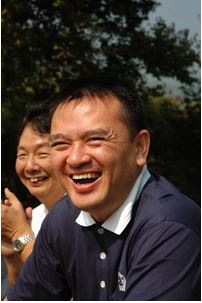
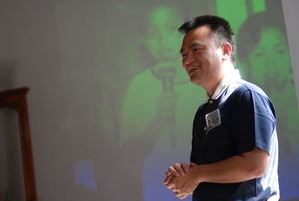
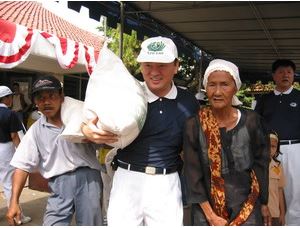
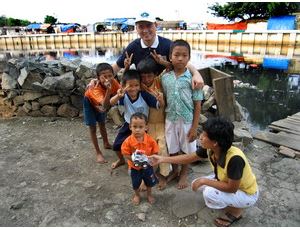
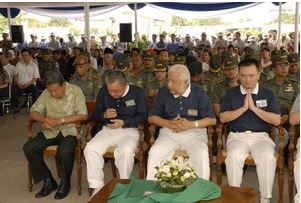








 Sitemap
Sitemap